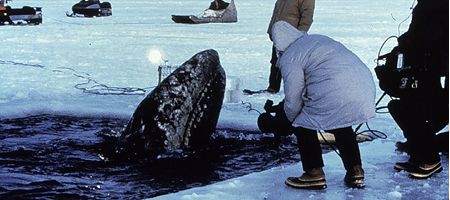Warming oceans are triggering an enormous movement of marine species, say scientists, and could threaten North Atlantic fishing stocks.

Melting sea ice has opened up a new Northwest Passage across the pole, and already species are taking advantage of it.
Around 800,000 years ago, a tiny species of plankton called Neodenticula seminae vanished from the North Atlantic. But it’s now back again, having drifted from the Pacific through the Arctic Ocean thanks to dramatically reduced polar ice.
“Such a geographical shift could transform the biodiversity and functioning of the Arctic and North Atlantic marine ecosystems,” the Sir Alister Hardy Foundation for Ocean Science warns.
And, at the other end of the size scale, a Pacific gray whale was spotted last year off the coasts of Spain and Israel. Scientists believe the ice-reduced Arctic allowed it to cross into the North Atlantic, from where it wandered its way to the Mediterranean Sea.
The findings are included in a new catalog by project CLAMER, a collaboration of 17 marine institutes in 10 European countries which synthesizes the results of almost 300 EU-funded climate change-related research projects over 13 years.
“The migrations are an example of how changing climate conditions cause species to move or change their behaviour, leading to shifts in ecosystems that are clearly visible today,” says Carlo Heip, director general of the NIOZ Royal Netherlands Institute for Sea Research, which leads the CLAMER project.
The Alister Hardy Foundation for Ocean Science (SAHFOS) is documenting the change in plankton through the Continuous Plankton Recorder Survey, the longest and most geographically extensive marine biological survey in the world.
And it’s found that populations of tiny animals called copepods are changing too, threatening the food supply of fish such as cod, herring and mackerel, as well the many marine mammals that prey on fish.
As the waters of the Atlantic and the North Sea warm, a copepod known as Calanus finmarchicus is being replaced by varieties that are smaller and less nutritious. As a result, say the researchers, some fish stocks have collapsed and there’s been a decline in fish-eating North Sea birds, the researchers report.
Harbour porpoises migrated from the northern North Sea when sand eels, a mainstay of their diet, moved poleward with the nutritious copepods.
“Most of the impacts are so clearly negative, and the scope of change so potentially huge that, taken together, they constitute brightly flashing warning signals,” says Heip.
Many other species are also moving north.
“The predictions of higher average temperatures and milder winters in the North Sea make it likely that these species will increase further in abundance and move northward,” say Netherlands Institute for Ecology (NIOO) scientists.
“This will affect the North Sea food web and therefore commercial species by predation on juveniles and competition for food resources.”






